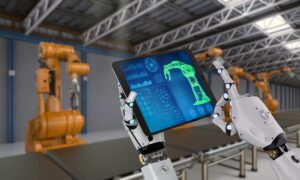In today’s rapidly evolving manufacturing landscape, staying competitive is more important than ever. With advancements in technology and an ever-increasing demand for faster turnaround times, it can be challenging for manufacturing businesses to keep up. Automation presents a solution that can help companies navigate these challenges and thrive in increasingly competitive markets. Here, we’ll explore how automation can help you to maintain a competitive edge in the market.
Why Should Your Manufacturing Business Invest in Automation?
While automation is nothing new, there are still many businesses that are failing to take advantage of this useful technology and are therefore falling behind the competition. According to Johnathan Craddock, Managing Director at CJS Automation, “Automation can significantly help your manufacturing business stay competitive in today’s market by reducing labour costs, improving quality and accuracy, and increasing efficiency.”
Through advanced technology and robotic systems, manufacturers can streamline their operations, increase productivity, improve quality, and reduce costs almost instantly.
Increased Efficiency
Automated systems can help your manufacturing business to operate at a significantly faster pace compared to manual labour while maintaining excellent consistency, even with 24/7 production lines. Additionally, with the ability to program and control various aspects of the manufacturing process, automation allows for greater flexibility and adaptability to changes in demand which ultimately leads to higher levels of efficiency and productivity.
Improved Quality and Accuracy
Automated systems are designed to perform repetitive tasks with precise accuracy, resulting in consistently high-quality products. This not only enhances the overall reputation of the manufacturing business but also reduces the likelihood of defects and errors, saving time and resources in the long run.
Human error is inevitable in highly repetitive but demanding tasks, such as the manufacturing process of kief covered pre roll joints. Robots are essential for businesses in the cannabis industry that want to stay ahead of the competition, ensuring consistency and quality in every product.
Lower Labour Costs
There is no getting away from the fact that labour costs are increasing, and this can make it hard for you to keep your manufacturing business competitive. However, the beauty of automated systems is that, after the initial investment, they can help you significantly reduce your labor costs. This lowers overall production costs and helps eliminate the risk of human error, resulting in higher quality and more accurate products.
Increased Innovation
Thinking ahead to the future, the power of automation also enables manufacturers to stay ahead of the curve and remain competitive in rapidly changing markets. By embracing advanced technology and robotics, manufacturing businesses can innovate and differentiate themselves from their competitors. This attracts customers who value innovation and quality and positions their business as a leader within their industry.
With new technologies being developed each year and investment at an all-time high, the next decade is a fascinating time for automation in manufacturing. The benefits of automation are substantial and essential for any manufacturing business looking to thrive in the modern age.
Conclusion
In conclusion, the imperative for manufacturing businesses to invest in automation has never been clearer. In today’s dynamic landscape, characterized by rapid technological advancements and intense market competition, automation is a pivotal tool for maintaining a competitive edge. The multifaceted benefits of automation, including increased efficiency, improved quality and accuracy, lower labor costs, and heightened innovation capabilities, underscore its significance in driving success and sustainability.
By embracing automation, manufacturers can unlock new levels of productivity, agility, and profitability while navigating the complexities of modern production demands. Furthermore, automation optimizes current operations and fosters a pathway for future growth and evolution. As we embark on the journey of the next decade, the transformative potential of automation in manufacturing remains vast and indispensable, propelling businesses towards unprecedented levels of success and resilience in the ever-evolving marketplace.



































